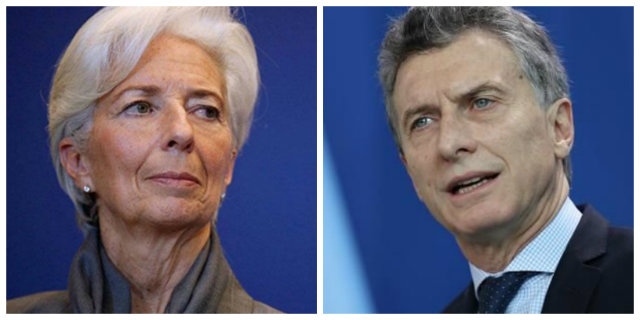
BUENOS AIRES – The International Monetary Fund has agreed to lend Argentina up to $50bn (£37.2bn) as the country seeks to bolster its struggling economy.
The three-year agreement must still be approved by the IMF board.
Argentina, which has been plagued by economic problems for years, asked for assistance from the IMF on 8 May after its currency hit an all-time low.
The country has committed to tackle its double digit inflation and public spending as part of the deal.
“The [Argentine] authorities have indicated that they intend to draw on the first tranche of the arrangement, but subsequently treat the loan as precautionary,” the IMF said in a statement on Thursday.
Both sides reached an agreement on a 36-month Stand-By Arrangement (SBA) amounting to US$50 billion (equivalent to about SDR 35.379 billion or about 1,110% of Argentina’s quota in the IMF).
This staff-level agreement will be subject to approval by the IMF’s Executive Board, which will consider Argentina’s economic plan in the coming days.
Argentine President Mauricio Macri’s decision to ask the IMF for help was criticised by many within his country.
Three of four Argentines opposed to ask for financial help from IMF
The IMF is widely loathed and blamed for Argentina’s 2001 economic collapse after it pulled the plug on the country and denied it financial support.
But Mr. Macri had said previously a fresh loan from the Fund would allow his government to strengthen a programme of growth and development “giving us greater support to face this new global scenario and avoid crises like the ones we have had in our history”.
Ms. Christine Lagarde, Managing Director of the International Monetary Fund (IMF), issued the following statement on the staff level agreement: “I congratulate the Argentine authorities on reaching this agreement. As we have stressed before, this is a plan owned and designed by the Argentine government, one aimed at strengthening the economy for the benefit of all Argentines. I am pleased that we can contribute to this effort by providing our financial support, which will bolster market confidence, allowing the authorities time to address a range of long-standing vulnerabilities. As part of this support, both the IMF and the Argentine government intend to work together to ensure steps are taken, and the resources are fully available, to protect the most vulnerable in the population as economic reforms move forward.
“At the core of the government’s economic plan is a rebalancing of the fiscal position. We fully support this priority and welcome the authorities’ intention to accelerate the pace at which they reduce the federal government’s deficit, restoring the primary balance by 2020. This measure will ultimately lessen the government financing needs, put public debt on a downward trajectory, and as President Macri has stated, relieve a burden from Argentina’s back.
“We also strongly support the redoubling of efforts to lower inflation, which we know eats into the foundation of economic prosperity in Argentina and is borne directly by society’s most vulnerable. In this vein, we endorse the central bank’s decision to adopt realistic and meaningful inflation targets and their commitment to maintain a flexible and market-determined exchange rate. We are also encouraged by the authorities’ commitment to ensure legal independence and operational autonomy for the central bank and to immediately put an end to central bank financing of the federal deficit.
“A central plank of the authorities’ plan is to put in place measures that will offer opportunity and support to those living in poverty and for the less well-off members of Argentine society. As a clear signal of these priorities, the authorities have pledged to maintain a floor on social assistance spending. They are committed to ensuring that spending, as a share of GDP, does not decline during the next three years. Additionally, if social conditions worsen, there are provisions to further increase the budget allocation for social priorities.
“Finally, I am particularly supportive of the efforts to level the playing field between Argentine men and women notably by introducing reforms in the tax code and social legislation. This is also consistent with the agenda that President Macri has underlined during Argentina’s leadership of the G20.
“In sum, I believe that Argentina’s reforms deserve the support of the IMF and the international community and I look forward to soon discussing Argentina’s request for support with the IMF’s Executive Board.”



